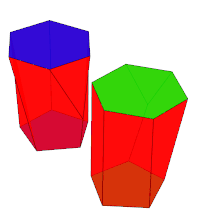Scutoid
[1][2] The object was first described by Gómez-Gálvez et al. in a paper entitled Scutoids are a geometrical solution to three-dimensional packing of epithelia, and published in July 2018.
[1] Unofficially, Clara Grima has stated that while working on the project, the shape was temporarily called an Escu-toid as a joke after the biology group leader Luis M.
... For the computational biologists who created/discovered the Scutoid, the key property of the shape is that it can combine with itself and other geometric objects like frustums to create 3D packings of epithelial cells."
- Laura Taalman[7][8]Cells in the developing lung epithelium have been found to have more complex shapes than the term "scutoid", inspired by the simple scutellum of beetles, suggests.
[9] When "scutoids" exhibit multiple Y-shaped connections or vertices along their axis, they have therefore been called "punakoids" instead,[10] as their shape is more reminiscent of the Pancake Rocks in Punakaiki, New Zealand.



